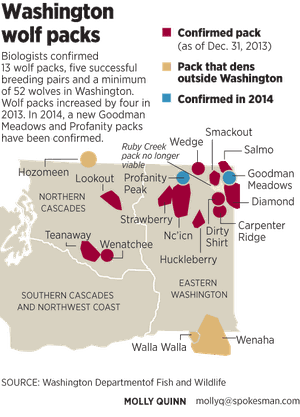Wolf update: Packs moving; big-game populations holding steady
ENDANGERED SPECIES -- A just-released update on wolf management in Washington indicates that wolf packs are shifting territories somewhat and that they are not having significant detectable impacts on the state's big-game herds.
Following is a portion of the update from Dave Ware, Washington Department of Fish and Wildlife wolf program leader:
Summary of capture and monitoring efforts for the spring and summer to date.
- WDFW staff placed two collars on yearlings in the Smackout Pack.
- WDFW staff placed a collar on what we think is the breeding female in the Profanity Peak Pack. This collared wolf is spending its time north of where we thought the Profanity Peak Pack was located, which may mean that it is either a different pack or that the pack has shifted to the north.
- Wildlife Services staff placed a collar on an adult female wolf from the Dirty Shirt Pack.
- WSU placed a collar on what we think is the breeding female from the Lookout Pack.
"We are pleased with our success to date, but would like to know more about the Huckleberry Pack and Profanity Peak Pack. So we will be looking for recent activity and setting traps to collar additional wolves in these areas over the next few weeks. The collared wolves in both of these packs appear to be spending their time this summer well north of where they had been in past years. Therefore we will be looking in the area of their historic locations to the south of the currently collared wolves.
"We are also planning to get back into the area of the Carpenter Ridge Pack. We have already set traps in this territory without success and it is time to get back in there to see if we can find current activity. We will trap other pack territories opportunistically where we do not currently have collars deployed and look for new packs when we verify recent wolf activity."
Outreach Efforts
"WDFW presented an update on the status of ungulate populations in areas with wolves to the Game Management Advisory Council on June 6. A copy of the presentation is posted on the wolf web page.
"At this point in wolf recovery, we are not seeing anything in the harvest or survey data that would indicate a decline in deer, elk, or moose populations."

